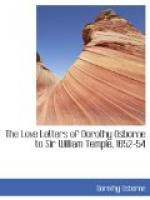I shall lose my eyes and you this letter if I make it longer. Farewell.
I am, yours.
Letter 67.—Elizabeth, Queen of Bohemia, was the daughter of James I. She married the Elector Frederick, who was driven from his throne owing to his own misconduct and folly, when his wife was forced to return and live as a pensioner in her native country. She is said to have been gifted in a superlative degree with all that is considered most lovely in a woman’s character. On her husband’s death in 1632 she went to live at the Hague, where she remained until the Restoration. There is a report that she married William, Earl of Craven, but there is no proof of this. He was, however, her friend and adviser through her years of widowhood, and it was to his house in Drury Lane that she returned to live in 1661. She is said to have been a lover of literature, and Francis Quarles and Sir Henry Wotton were her intimate friends. The latter has written some quaint and elegant verses to his mistress; the last verse, in which he apostrophizes her as the sun, is peculiarly graceful. It runs thus:
You meaner beauties of the
night,
That poorly satisfy our eyes,
More by your number than your light,—
You common people of the skies,
What are you when the sun shall rise?
But the sun is set, and the beautiful Queen’s sad, romantic story almost forgotten.
Sir John Grenvile was a son of the valiant and loyal cavalier, Sir Bevil Grenvile, of Kelkhampton, Cornwall. He served the King successfully in the west of England, and was dangerously wounded at Newbury. He was entrusted by Charles II. to negotiate with General Monk. Monk’s brother was vicar of Kelkhampton, so that Grenvile and Monk would in all probability be well acquainted before the time of the negotiation. We may remember, too, that Dorothy’s younger brother was on intimate terms with General Monk’s relations in Cornwall.
There must be letters missing here, for we cannot believe more than a month passed without Dorothy writing a single letter.
I wonder you did not come before your last letter. ’Twas dated the 24th of August, but I received it not till the 1st of September. Would to God your journey were over! Every little storm of wind frights me so, that I pass here for the greatest coward that ever was born, though, in earnest, I think I am as little so as most women, yet I may be deceived, too, for now I remember me you have often told me I was one, and, sure, you know what kind of heart mine is better than anybody else.




